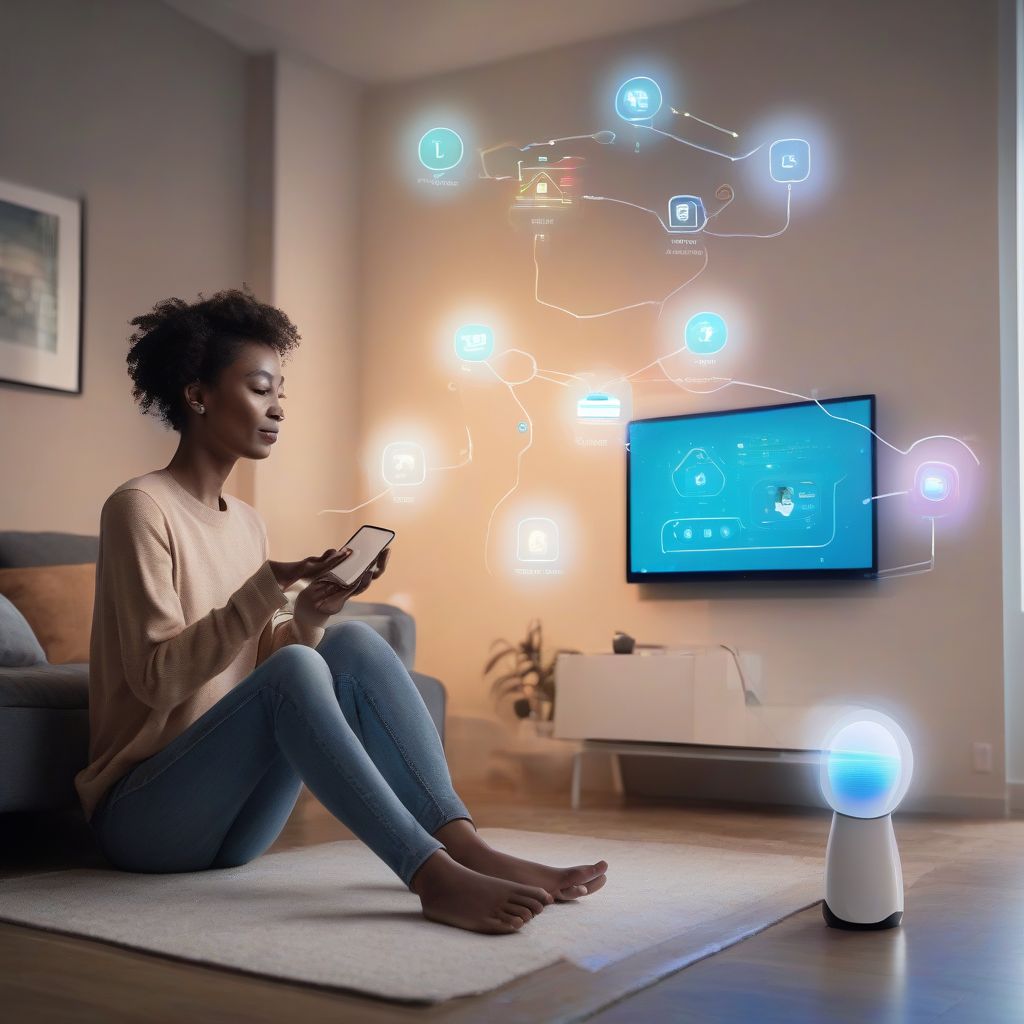Imagine waking up in a home that anticipates your needs. The lights gently brighten as your alarm goes off, the aroma of freshly brewed coffee fills the air, and the thermostat adjusts to your preferred temperature – all before you even step out of bed. This is not a scene from a futuristic movie; this is the promise of smart homes powered by automation and artificial intelligence (AI).
The Rise of the Smart Home Ecosystem
The concept of a “smart home” has evolved drastically over the past few years. What began with programmable thermostats and remote-controlled lighting has morphed into a complex ecosystem of interconnected devices, all orchestrated by sophisticated AI algorithms. This interconnectedness allows for a level of automation and personalization we could only dream of a decade ago.
One of the driving forces behind this revolution is the increasing affordability and accessibility of smart home devices. From smart speakers like Amazon Echo and Google Home to smart appliances like refrigerators that can order groceries, consumers are readily embracing technology that simplifies daily tasks and offers convenience.
How AI is Taking Smart Homes to the Next Level
While automation forms the backbone of a smart home, AI is the brain that truly brings it to life. Here’s how:
1. Predictive Behavior and Proactive Adjustments
AI thrives on data. By analyzing your daily routines and habits, AI-powered smart homes can predict your needs and proactively adjust settings accordingly. Imagine your home automatically adjusting the lighting based on your sleep schedule, preheating the oven as you start preparing dinner, or even reminding you to take your vitamins – all learned from your daily patterns.
2. Enhanced Home Security and Safety
Smart home security systems, equipped with AI-powered facial recognition and anomaly detection, offer a robust layer of protection. These systems can distinguish between familiar faces and strangers, alert you to unusual activity, and even contact emergency services in case of a security breach.
3. Personalized Comfort and Energy Efficiency
Imagine a home that not only responds to your commands but also anticipates them. AI can learn your preferred lighting for different times of the day, adjust the thermostat based on your presence and the weather outside, and even regulate water usage for optimal efficiency. This level of personalization translates to a more comfortable living environment and significant savings on energy bills.
 Smart Home AI Control
Smart Home AI Control
The Role of Interconnectivity and Data Security
The true potential of smart homes lies in the seamless integration of various devices and platforms. This interconnectivity allows your smart home ecosystem to function as a cohesive unit, with each device communicating and sharing data to optimize performance and personalization.
However, this interconnectedness also raises concerns about data privacy and security. As our homes become increasingly reliant on data collection and analysis, it’s crucial to prioritize security measures and ensure that our data is protected from unauthorized access and misuse.
Embracing the Future of Smart Living
The future of smart homes is bright, fueled by advancements in AI, machine learning, and the Internet of Things (IoT). As technology continues to evolve, we can expect even more sophisticated features and capabilities, further blurring the lines between science fiction and reality.
1. The Rise of Voice Control and Natural Language Processing
Voice control is quickly becoming the preferred method of interaction with smart home devices. AI-powered voice assistants are becoming increasingly adept at understanding natural language, making it easier than ever to control your home with simple, intuitive commands.
2. The Growing Importance of Sustainability
As environmental concerns take center stage, smart homes are poised to play a crucial role in promoting sustainable living. From optimizing energy consumption to reducing water waste, AI-driven smart homes can help us minimize our environmental footprint without sacrificing comfort or convenience.
3. The Integration of Robotics
While still in its nascent stages, the integration of robotics into the smart home ecosystem holds immense potential. Imagine robotic assistants that can help with household chores, provide companionship, or even offer personalized care for the elderly or those with disabilities.
Navigating the Challenges and Concerns
While the benefits of smart homes are undeniable, it’s essential to address the challenges and concerns that accompany this technological revolution.
1. Data Privacy and Security
As our homes collect vast amounts of personal data, safeguarding this information is paramount. Robust security protocols, data encryption, and transparent data usage policies are crucial for building trust and ensuring the responsible development of smart home technology.
2. Digital Divide and Accessibility
The adoption of smart home technology should not exacerbate existing societal inequalities. It’s essential to make these technologies accessible and affordable to all, ensuring that everyone can benefit from the convenience, comfort, and safety they offer.
3. Interoperability and Standardization
With a plethora of smart home devices and platforms available, ensuring seamless interoperability is crucial. Industry-wide standards and open-source platforms can help prevent fragmentation and ensure that devices from different manufacturers can communicate and work together effectively.
Conclusion
The future of smart homes is filled with promise and potential. As automation and AI continue to evolve, our homes will become more intuitive, responsive, and personalized than ever before. By embracing these advancements while addressing the ethical and societal implications, we can create a future where technology enhances our lives and empowers us to live smarter, safer, and more sustainable lives.
Ready to delve deeper into the world of smart home automation? Explore our articles on How Home Automation Can Help Save Energy and Reduce Bills, How to Integrate Smart Home Devices into Your Daily Life, and The Role of Smart Home Hubs in Connecting Devices to learn more about harnessing the power of technology for a smarter, more connected home.
Don’t forget to share your thoughts and experiences with us in the comments below!
[amazon bestseller=”Smart Home”]
